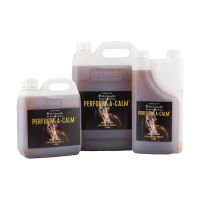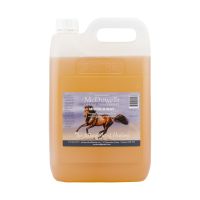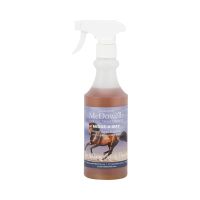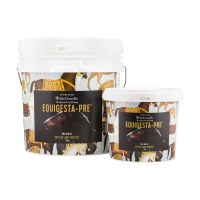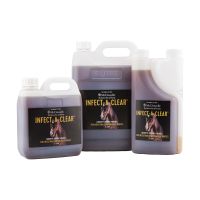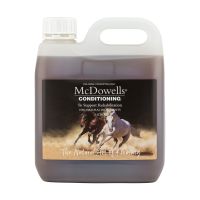If storms and flooding are particularly bad, stress can be a factor for some horses. The best thing to do is to try to move your horses to higher ground with better drainage, whilst keeping their routine as close as possible to normal. Make sure there is clean water available, their feed is not exposed to flooded or severely damp areas, and that they have access to a dry area to stand.
The effects of stress can cause ongoing issues for your horse. A trauma like heavy storms and flooding can trigger a metabolic disorder that may have been 'simmering away' undetected. Often, these conditions present symptoms like laminitis.
Utilising McDowells Perform-a-calm, Metabolic S , or Conditioning Tonic in the first instance to rebalance them can help prevent further issues from developing. The chamomile in the Equigesta-Pre will also be good for this, but some horses may need some extra support, especially those horses that are more highly strung at the best of times.
Pasture and paddocks
Flooding and heavy rain can bring a multitude of issues for paddocks. Deep mud can pose a hazard for a horse; if they get stuck, they can pull tendons, fracture a limb, or seriously injure themselves by struggling in the deep, sticky sludge.
The first thing to do after heavy rain is to check the area for any physical damage and debris. Remove any rubbish, check fencing (posts and wire), and look for any erosion and sinkholes. Scrub, disinfect and dry buckets and troughs, ensuring that they are rinsed well.
Continually wet and boggy pastures can create mould and spore blooms that cause other issues like mycotoxin. Mycotoxins are toxins produced by a fungus, and a binder may be required, such as zeolite.
Skin and hoof conditions
Horses forced to stand in flooded pastures are prone to develop thrush, abscesses, and greasy heel. Frequent observation and care of feet are critical in these environmental conditions. Excessive rain can cause rain scald, mud fever, and foot problems.
Some horses may develop dermatitis (skin infection) and cellulitis (limb swelling) from standing in contaminated water for long periods, which can become more serious, potentially causing conditions like septic arthritis and lameness if not treated appropriately. Cellulitis will appear as swelling and heat in affected areas and the horse might be lame and sore. Fungal infections on the skin can also appear.
Once the storms have passed your horse should be decontaminated by bathing with medicated shampoo to clean toxins, debris or microorganisms from your horse’s skin. This is a good opportunity to inspect the horse and look for any injuries, bumps, strains and skin issues. Debris and mud should be picked out of hooves and the hooves inspected closely.
Disease and illness
Contaminated water can spread waterborne illnesses such as leptospirosis. If your horse's drinking water has been affected by flooding or high water levels, have the water checked and analysed. Horses that have ingested contaminated water may develop gastrointestinal issues, diarrhea or other forms of colic or systemic toxaemia (sepsis). Common signs include lethargy, inappetence, colic fever and diarrhea.
Some horses that have been caught in flood water will have gone through big thermal stress, and some may have experienced hypothermia if stuck in running water. This takes a lot of energy and reserves from the body to maintain their core temperature. The McDowells Conditioning Tonic will be good for recovery for this.
Be aware of unusual nasal discharge, coughs, ocular injuries, lethargy, and high temperatures.
Hoof and leg issues
Standing in mud or water for long periods can bring on issues like thrush, soft soles and sloughing of the frog, which may bring on other hoof problems like laminitis. 'Pulled' shoes are common, along with abscesses, bruised soles, and white line disease (anaerobic bacteria or fungi). Farriers also see more coffin bone fractures during this time, often linking it to the horse’s feet sinking into very deep mud.
Another issue for the horse’s appendages mentioned previously is Mud Fever. This occurs mostly around the coronet, heels and pastern in horses but can also occur higher on the leg or belly. It is caused by a bacterium known as Dermatophilus congolensis which thrives in wet conditions and therefore the condition is more common during the winter months.
Like any illness, it’s not just one thing that will start a bout of mud fever or rain scald. Environmental factors such as cold and wet and health factors such as stress or a lowered immune system along with skin damage are all required to let the bacteria take hold.
The bacteria penetrate chapped, damaged or softened skin and the legs develop weepy sores which lead to scabs. In severe cases, the leg may swell, and the horse may develop lameness.
Horses or ponies with heavy feathers on the leg can be particularly prone to mud fever in extremely muddy conditions, as the hair becomes covered in wet mud and remains damp. Horses with white legs and pink skin are also increasingly prone to Mud Fever.
If Mud Fever is left untreated, the infection will spread up the legs, causing them to swell and be intensely sore, resulting in the potential for the horse to become lame. Infections in other areas can cause inflammation, soreness and hair loss, severe infections and abscesses.
Mud fever can be prevented by bringing the horse or pony in periodically to allow the legs to dry completely and brushing off all mud.
Injuries
Horses often experience puncture wounds in muddy and poorly drained areas. These wounds may go unnoticed if the horse's legs are caked in mud. This can lead to a variety of issues that could have serious consequences for your horse. Attending to wounds in a timely fashion can ensure your horse has their best chance of sustaining optimum health.
Damp or mouldy feed
It is imperative to keep feed, hay and supplements out of water and as dry as possible. Hay that has been sitting in, or close to, a flooded or damp area should be disposed of and never given to horses. Horses that consume mouldy hay or feed as a result of flooding conditions may be prone to colic and digestive issues.
McDowells suggestions
Equigesta-Pre
It is imperative that your horse's GIT is still being protected and microbiota restored. Equigesta-Pre contains a combination of pure herbal powders, brewer's yeast and bentonite clay. Traditionally this combination has been used to aid and promote beneficial intestinal microorganisms.
Infect-A-Clear
The herbs in this mix are given stimulate the horse’s own natural elimination which may help to clear metabolites, thereby improving the immune system's response. Robust immune systems routinely eliminate infective and metabolic waste as part of a healthy system. A system that is overloaded with inflammation, infection or metabolic waste has a much harder time recovering.
Midge-A-Way
Midge-away has been developed in response to the increasing demand for insect repellents that are 100% chemical-free. This product can be used pre and post-ride to deter annoying flying insects. Can also be used as an environment spray in the stable area.
Hoof Heel
This oil-based treatment is a mixture of herbal oils and extracts that heats and brings circulation to all tissue and bone in the area. It assists with healing both bones and ligament attachments and any other damage while improving circulation dramatically and reducing inflammation.
Conditioning Tonic
The herbs in this formulation have been traditionally used and prescribed for rehabilitation in horses that have suffered a major health breakdown, suffered poisoning, snake bite or have, for other reasons, developed liver or kidney damage or are recovering from a major illness, surgery or accident. The tonic may protect your horse from repercussions and relapses during recovery. Spelling time may also be reduced dramatically.
Perform-A-Calm
This tonic is formulated with herbs that have traditionally been used to nourish and calm the nervous disposition of horses that seem to be overly anxious in their home or when introduced to new stimuli or stressful situations.

